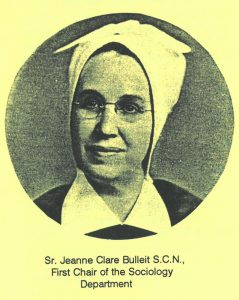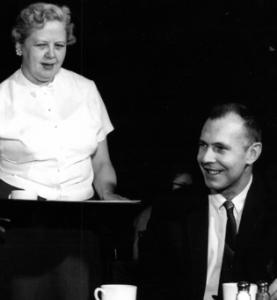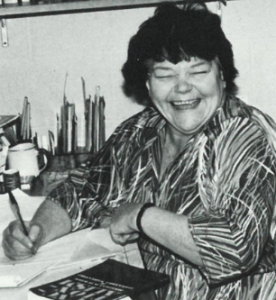By Raymond G. Hebert, PhD
Thomas More University
Part 45 of our series, “Retrospect and Vista II”: Thomas More College/University, 1971-2021
It was early in the 1930s, actually under the auspices of the History Department (1933), that a two-credit hour course was offered entitled “Introduction to Sociology,” with the Rev. Anthony Deye as the instructor.The course was so popular that it became a permanent addition in the 1940s (1944). According to the Thomas More Archives, the very first sociology class had been offered as early as 1924 but it “had been eliminated in 1928 due to changes in teacher certification standards” (Archivia, Vol. 8 No. 1, September 1997, Thomas More University Archives).

Fr. Anthony Deye, professor of history. (Courtesy of Kenton County Public Library)
Not surprisingly, the overall increase in enrollment after WWII (because of the push for co-educational growth and the G.I. Bill), resulted in interest and pressure for a curriculum expansion. Sociology was one of the fields recommended by the newly-arrived male students. It may be remembered that the early growth of Villa Madonna College in the late-1920s and the 1930’s had been directly connected to the willingness of the three orders of founding sisters (Benedictine Sisters; Sisters of Notre Dame; Sisters of Divine Providence) to commit to the staffing of key departments. What can be surmised, with only one introductory sociology course offered each year between 1933 and the mid-1940s, is that none of the religious orders were either credentialed or interested in the field.
Fr. Deye was a historian by training and not credentialed beyond a basic introductory offering in sociology. Under those circumstances, the dean (president) of the College, the Rev. Thomas A. McCarty, contacted a fourth order of sisters, the Sisters of Charity of Nazareth, and asked them to assign a sister.
It was Sister Jeanne Clare Billett S.C.N. who was sent by her community to serve as the first chair of the Sociology Department in the spring of 1947. The initial student “majors” were welcomed in the fall of that same year. For the inaugural year, in addition to Fr. Deye’s Introductory class, five other courses were offered between the two semesters of 1947-1948: Social Change and Social Problems; Christian Social Reform; Child Welfare; Child Development; and Family Case Work (Archivia). Because of the nature of the content and the importance of contact with practitioners in the field, many partnerships were pursued with area social service agencies.

Sr. Jeanne Clare Bulleit S.C.N., first chair of the Sociology Department. (Thomas More University Archives)
The result was a noticeable expansion in the 1950s. Sister Frances Rita Ballard of the Sisters of Charity of Nazareth replaced Sister Jeanne Clare as department chair in 1953. By the mid-1960s, ready for the move to the new campus in 1968, the faculty of the department consisted of three fulltime instructors. The two with the longest terms at the college were Michael Endres, who would become the chair from 1967–1971, and Mary Harmeling, who led the department from 1971–1976.
In 1971, with the vision of Michael Endres, the department was expanded with the hiring of a fulltime social work instructor (Bob Berger), which made it possible to introduce the Social Work program in 1973. See the NKyTribune history column here.

Sr. Rita Francis, sociology professor. (Thomas More University Archives)
With Mary Harmeling at the helm of sociology, a Criminal Justice program was also added, beginning in 1974. While the criminal justice enrollment would decline in the 1980s, with the demise of the social work program in 1993, it was Maryline Glover who proposed a rejuvenation of the criminal justice major in 1994. By the following year, the expanded recruiting efforts paid dividends, and soon criminal justice was even outpacing sociology in its number of majors. As an example, in the 1995-1996 academic year, 47 students were working toward a baccalaureate degree in criminal justice, with 18 working toward the same degree in sociology (Archivia).
Upon her arrival, Maryline Glover had been an inspiration to the department and was a strong partner for both Bob Berger, as well as Sr. Mary Jo Baumgartmer, who was chair from 1982–1988. Sadly, at what was clearly a high point in her career in the mid-1990s, Professor Glover experienced a health crisis (1995). Bob Berger filled in as the head of the department in her place for the remainder of that decade. Glover, who had played a major role as chair in championing the rejuvenation of the criminal justice program and who had co-presented papers at multiple conferences (with Bruce Gibson), had (with Bob Berger’s help) expanded the enrollment in the majors of criminal justice and sociology as never seen previously. As we approached a new century, Maryline Glover was much missed by her peers and especially her students when she was not able to return.

Dr. Mary Harmeling and Michael Endres. (Thomas More University Archives)
Into the 21st century, the Sociology and Criminal Justice Department has been blessed to have a triumvirate of strong teaching faculty, two with over 30 years of service in sociology (Professors Ellie Megerle and Dr. James Camp) and a third in criminal justice, Dr. Amy Thistlethwaite. Both majors have had consistent success in preparing students for the world of work, as well as postgraduate study. Among the greatest successes in sociology are the many internships available to students on both sides of the Ohio River and, since the early 2000s, the involvement of students in “Service-based” study-abroad on the Mexican border (El Paso, Texas) with Dr. Camp. Later in the 2010s, Professor Camp inherited accounting professor Thomas Gilday’s successful Jamaica Service-Learning Program (JSLP) (See the NKyTribune history column here.)
In regard to criminal justice, current information summarizes the program best:

Maryline Glover, professor of sociology. (Thomas More University Archives)
“Criminal Justice students at Thomas More University examine crime and justice from a multidisciplinary approach using theories from sociology, economics, political science, and history. Our majors learn skills such as oral and written communication, critical thinking, research methods and computer technology (and) the department curriculum is geared toward flexibility allowing students to tailor coursework around interests and career aspirations … from crime prevention and social services to positions in law enforcement, the courts or corrections.” (Thomas More University Information Card, Criminal Justice, 2022).
At present, the Sociology and Criminal Justice Department continues to provide two strong options for students wishing to study and practice the social sciences.

Dr. James Camp (Courtesy of Thomas More University Archives)
Currently (Spring 2022), this is heavily weighted towards the practitioner component, with 47 majors and 16 minors in criminal justice, and 7 majors and 11 minors in sociology. In that context, it could be said that the greatest strength of the department, in addition to the outstanding chemistry among the current faculty, is the accepted belief that together the two majors create one seamless program. Faculty in the department teach cross-listed courses for both sets of majors, with similar internships for all students on both sides of the Ohio River. What matters, above all else to students and faculty alike, is that their team celebrates their many successes today in tribute to their predecessors of decades past.
Dr. Raymond G. Hebert is a Professor of History and Executive Director of the William T. Robinson III Institute for Religious Liberty at Thomas More University. He has just completed his 46th year at Thomas More and, with that background, will now serve as the General Editor of the official history of Thomas More College/University from 1971-2021. With a projected title of RETROSPECT AND VISTA II, it will serve as the sequel to Sr. Irmina Saelinger’s RETROSPECT AND VISTA, the history of the first 50 years of Thomas More College (formerly Villa Madonna College). He can be contacted at hebertr@thomasmore.edu.
We want to learn more about the history of your business, church, school, or organization in our region (Cincinnati, Northern Kentucky, and along the Ohio River). If you would like to share your rich history with others, please contact the editor of “Our Rich History,” Paul A. Tenkotte, at tenkottep@nku.edu. Paul A. Tenkotte, PhD is Professor of History and Gender Studies at Northern Kentucky University (NKU) and the author of many books and articles.
























